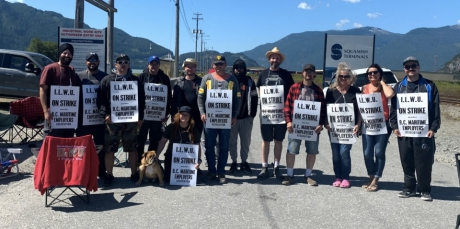Reports
You are here
Victory to the Longshore workers!

July 7, 2023
Around 7,400 workers at more than 30 ports in British Columbia have been on strike since July 1. Every year, these members of the International Longshore and Warehouse Union move $180 billion worth of cargo which represents 16% of all of Canada’s trade. That’s over $500 million of cargo every day. The power of these workers to disrupt profits has terrified business owners and their representatives in the provincial and federal governments.
The union has been trying to get the British Columbia Maritime Employers Association to agree to a reasonable settlement for their members since February. In a statement from the union, ILWU president Rob Ashton explained that, “Longshore workers kept this Province and the Country running during the Pandemic and when Canadians were told to shelter in place, our people went to work! We worked in difficult and hazardous conditions to ensure that the communities where we live, and all Canadians had the necessary supplies and personal protective equipment to defend against the Covid19 virus. This was an unprecedented time in the history of the world and longshore workers stepped up and proved that we are here to support the people of Canada. It is unfortunate that our employers hold us in such contempt.”
Like employers everywhere, instead of showing gratitude to the essential workers that kept their profits flowing, the BCMEA refused to negotiate on the main issues for ILWU members. As a result, the union issued a strike notice, and lines have been up since 8AM July 1.
The union’s objectives in this round of bargaining are to stop the loss of work through contracting out, to deal with the employers planned job losses through increased automation, and to get a raise increase that protects them from inflation.
Increased automation
The Federal government approved construction of a new 177 hectare container ship port in the estuary of the Fraser river in April. In an area where 100 species are at risk of extinction. If completed the Roberts Bank 2 Project will increasing container terminal capacity by more than 30% on the west coast. The plans are for this to be a much more automated port with fewer jobs, plus the danger that new automation installed there will then be implemented at existing ports - leading to layoffs.
Pay increase
The employer’s association has been negotiating in the media - according to them median pay is $136,000 and the union wants an 11% increase.
According to the BCMEA, in 2020 dock workers handled $180 billion worth of cargo. There are 7400 union members, so they each handle $24 million worth of cargo a year on average. That means an 11% pay increase is equal to 0.06% of the value of the cargo that they handle. In other words a $60,000 car shipped through the port would increase in cost by $36.
The Port of Vancouver is not a member of BCMEA, The port made a profit of $150,000,000 in 2022. If we nationalize the port and put all of that profit into wages, you could give the ILWU members a 15% pay increase.
The employer made things worse over the July long weekend by walking away from negotiations. Their statement to the media concludes, “the BCMEA is of the view that a continuation of bargaining at this time is not going to produce a collective agreement. ILWU Canada needs to decide if they are going to continue this strike with no hope of settlement, or significantly modify their position.”
The employers are no doubt hoping to be rescued by their friends in the Federal Liberal government. The Canadian Federation of Independent Business and the Surrey Board of Trade have both called for the Federal government to legislate the ILWU back to work. The Surrey Board of Trade went even further calling for additional legislation to permanently take away dock workers right to strike.
The Federal Minister of Labour, Seamus O’Regan has been in Vancouver since the strike started negotiating with both the union and the bosses. So far, he has not talked about back to work legislation. But Liberals are no friends of workers. It was only two years ago when the Liberals passed legislation requiring the workers at the port of Montreal to return to work. Part of what’s holding them back this time must be fear that the legislation would be ignored and could spread solidarity strikes across the country.
Employers organizations have pointed to the halt of cargo as a source of inflation if the strike continues. What they are really saying is that their members will use any shortages or delays as an excuse to gouge us and raise their profits at our expense.
BC Premier Eby echoed business owners concerns before the strike started, saying that he’s “profoundly worried about the potential impact of a strike at our ports.” However, the BCNDP government’s response to the disruption to gasoline supplies in wake of the catastrophic 2021 flooding that closed all the highways into the lower mainland shows how he could allay his concerns and support the strikers. While the gasoline supply was halted the province imposed rationing and a price freeze. When this strike leads to shortages, the province could do the same thing, protecting working people from price hikes from greedy businesses.
When the Liberals show their true face as representatives of big business and bring in legislation against the dock workers we must all show our solidarity and join the picket lines to defy the law. A victory for the ILWU is a victory for all of us.
Section:
Topics:









